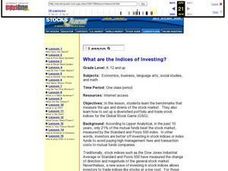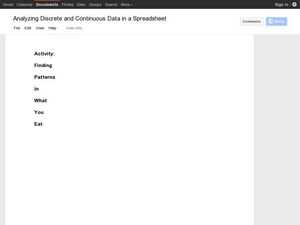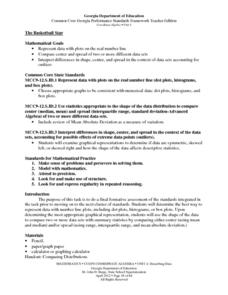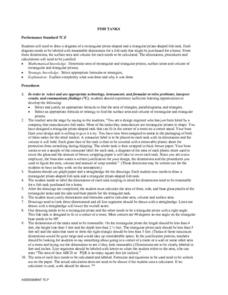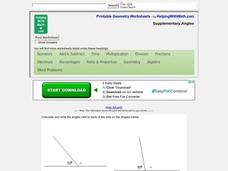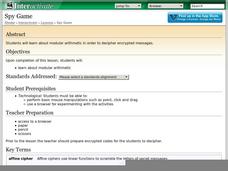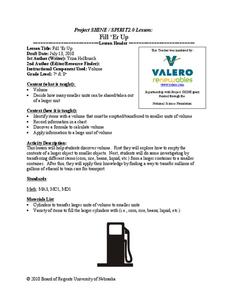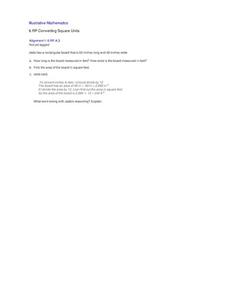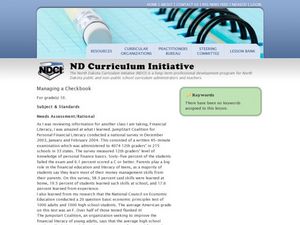Curated OER
Acid (and Base) Rainbows
Learners are introduced to the differences between acids and bases and how to use indicators, such as pH paper and red cabbage juice, to distinguish between them. They make predictions that can be answered through scientific...
Curated OER
What's Your Average? What Do You Mean? I'm More Than Just Average
Upper grade and middle schoolers collect data, analyze and interpret the data. This three-part lesson should provide learners with a firm understanding about the differences between mean, median, and mode and how to perform the...
Curated OER
Discovering Pi
Sixth graders measure circumference and diameter to the nearest eighth of an inch, record measurements on a spreadsheet, and use the internet to complete a "scavenger hunt" of facts concerning pi.
Curated OER
Lesson 9 What are the Indices of Investing?
Students explore the benchmarks that measure the ups and downs of the stock market. They also set up a diversified portfolio and trade stock indices for the Global Stock Game (GSG).
Curated OER
Does Sunlight Effect Leaf Size?
Students make estimates and then measure leaves for accuracy. They calculate the area of the leaves by drawing an outline on graph paper and counting the squares. They compare the leaves exposed to sunlight to those that are in constant...
Curated OER
Frost Depth Study
Students complete activities to study the frost and frost depth. In this frost study lesson, students use frost tubes to study and measure the frost at their school. Students measure the frost in the tube and enter their data online to...
Curated OER
Analyzing Discrete and Continuous Data in a Spreadsheet
You are what you eat! Your statisticians keep a log of what they eat from anywhere between a day to more than a week, keeping track of a variety of nutritional information using a spreadsheet. After analyzing their own data, individuals...
Curated OER
How Big Is Your Head?
Learners explore measurement by measuring classmates' heads. They record their measurements and they put the measurements in order from smallest to largest. Students figure the mean, median, mode, maximum, minimum, and range of their...
Curated OER
Social Studies: Area and Population Density
Math scholars of many ages examine the concept of population density and then discuss the significance of the population densities of Minnesota and China. They figure the population density of their school.
Illustrative Mathematics
Accuracy of Carbon 14 Dating I
Here is an activity that is intended to highlight a very important issue about precision in reporting and understanding statements in a realistic scientific context. Discuss different ways of reporting the half life of Carbon 14 using...
Georgia Department of Education
The Basketball Star
Have learners use math to prove they are sports stars! Assess a pupil's ability to create and analyze data using a variety of graphs. The class will be motivated by the association of math and basketball data.
Curated OER
Fish Tanks: Volume and Surface Area
Given a very realistic challenge, your young geometers design residential fish tanks in rectangular and triangular prism shapes. They compute the volume of water each will hold. They also determine the size of plastic covers for each...
Curated OER
The Crash Scene
Fifth graders explore geography by participating in a mapping activity. In this engineering lesson plan, 5th graders identify the differences between latitude and longitude and practice locating precise points on a globe or map. Students...
Curated OER
How Big is a Foot?
Introducing measurement can be as simple as reading a book and then using measurement tools to understand how big a foot really is. The class reads and discusses the book How Big is a Foot? by Rolf Myller, stopping often to consider the...
Curated OER
Slides, Flips. Turns......It's All On A Memory Book Page
Fourth graders use tangram sets to investigate the congruence of shapes. They use congruent shapes to demonstrate the properties of slides, flips, and turns. They complete a math journal entry that describes and illustrates each concept.
Helping with Math
Supplementary Angles
Pupils calculate the measurement of supplementary angles when one angle is known. The one-page assignment has six simple problems. It contains links to related resources as well as the answer key. Be aware that although the publisher...
Curated OER
Highs and Lows
Plot data using the number line and discuss how negative numbers are used in math and science. Sixth and seventh graders share their graph with the class and provide an explanation for their plotting.
Shodor Education Foundation
Spy Game
Turn students into detectives as they decipher encrypted messages. Introduce your class to modular arithmetic and have a little fun encrypting and decoding secret messages. The activity does not hit many content standards, but would be...
Curated OER
The Triple Beam Balance
Students explore mass measurement. They complete a diagram of a triple beam balance. Students explore using the triple beam balance to determine the mass of an object. They discuss procedures for using the triple beam balance.
Curated OER
Fill 'Er Up
Students identify how many smaller units can be found in a later unit. In this geometry lesson, students calculate the volume and the transfer amount to a smaller unit. They solve real life problems using the formula for volume.
Illustrative Mathematics
Converting Square Units
Jada has a rectangle board that is measured in inches. Young learners confirm their understanding of converting inches to feet. Then they find the area in square feet. Jada thinks she has a short-cut to convert inches square to square...
Curated OER
Calculating Your Foodometer
Students explore environmental issues by completing a food production class activity. In this carbon footprint lesson, students discuss the types of foods they eat, where they come from and what types of methods are used to transport...
Curated OER
Managing a Checkbook
How do grown ups do it? Teach your upper graders the ins and outs of personal finance by having them use their algebra skills to balance a checkbook. They examine the financial side of math, set up a checking account, and balance their...
Curated OER
Gifts from Grandma, Variation 1
Composed of three word problems, this math activity exposes young mathematicians to relationships present in multiplication and division. The first problem is most useful with a tape diagram in which learners are working with equal-sized...





